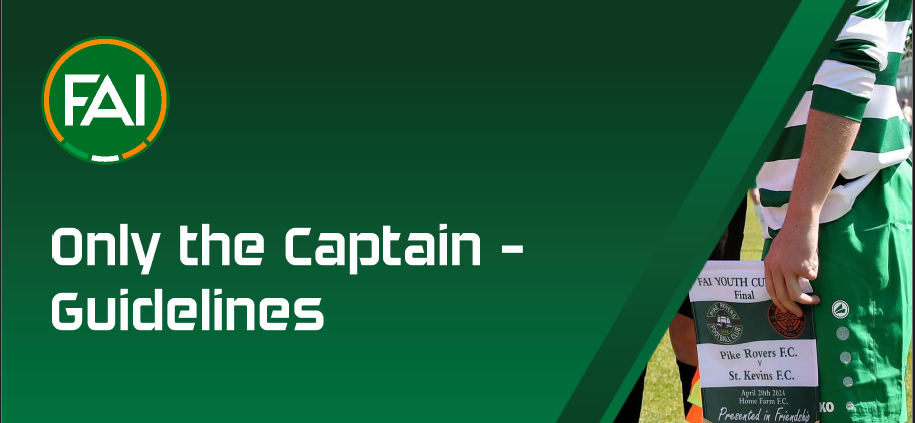FAI Introduces “Only the Captain” Policy Guidelines
Respect and fairness towards all participants are core values of our sport. However, referees and other match officials are regularly subjected to verbal and/or behavioural dissent when they make decisions. In extreme cases, players sometimes run at referees and surround or mob them, which shows a lack of respect for the referee, harms the image of the game and can be intimidating and upsetting.
In an effort to develop stronger collaboration between the referee and teams a new system of communication between the referee and team captains will be implemented from the start of this season. It is designed to increase transparency, help instil fairness and develop mutual respect.
Referees will now offer an explanation of key decisions, to the team captain who will be allowed to approach the referee, provided that they do so respectfully and conduct themselves in a calm and respectful manner.
At the same time, it will be the responsibility of each captain to ensure that their team-mates remain a reasonable distance from the referee and do not interfere in the interaction between the referee and the team captain(s).
The following simple guidelines will assist us in to applying the ‘only the captain’ principles. These should be communicated to all stakeholders.
Standard Guidelines
- Normal interactions between players and the referee are allowed and remain important (to increase transparency and avoid possible frustration and conflict).
- Any player (including the captain) who shows dissent by word or action will be cautioned (yellow card).
- The referee will, where appropriate, explain important decisions to the captain(s)
- To prevent players mobbing or surrounding the referee after key incidents or decisions the following steps will apply:
- only one player from each team – the captain – is allowed to approach the referee and, when doing so, they must always interact in a respectful manner
- the referee may instruct/encourage players (verbally or with gestures) not to approach them
- the team captains are responsible for helping to direct their team-mates away from the referee;
- players who approach/surround the referee when they are not permitted to do so may be cautioned (yellow card);
- if appropriate, the referee may delay the restart of play to allow the captain(s) time to speak with their team-mates to explain a decision, demand proper behaviour, etc.
- Interaction with, or an approach by, any player other than the captain is at the discretion of the referee, e.g. if the player has committed an offence, been fouled and/or is injured.
- Where the goalkeeper is the captain, the referee must be told, no later than at the coin toss before kick-off, which player is nominated to approach the referee instead of the goalkeeper.
- Only the goalkeeper or the nominated player, not both, may approach the referee.
- If the nominated player is substituted or sent off, another player must be nominated.
- Inform the team managers of the ‘only the captain’ policy when meeting prior to kick off.
- Inform the players of the ‘only the captain’ policy when checking the players equipment.
- Inform both captains at the coin toss that they will explain key decisions, and only the captains will be allowed to approach the referee, provided that they do so respectfully
- Penalty kicks
- Red cards
- Significant foul play
- Disallowed goals




